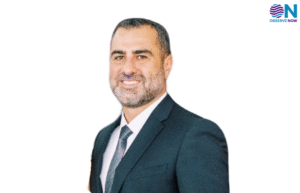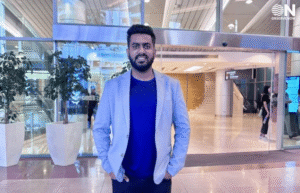DCM Shrirams CHRO Unveils 4Bs Framework for Innovative Talent Strategy: Exclusive Interview with ObserveNow
New Delhi: In the dynamic landscape of human resources, crafting a robust talent strategy and hiring approach is paramount for organizational success. As businesses navigate the complexities of the modern workforce, the perfect recipe involves a delicate balance that considers the evolving needs of the industry and the aspirations of the workforce.
Anticipating the requirements of the future, organizations are challenged to adopt innovative approaches that blend the experience of veteran professionals, the fresh perspectives of newcomers, and the unique contributions of individuals returning to the workforce, especially women. In this regard, Shreya Singh, ObserveNow, interacted with Sandeep Girotra, CHRO, DCM Shriram.
Here are a few excerpts from the interview:
What’s your organization’s approach to talent strategy and hiring? Is there a perfect recipe to get it all right or is it always a balanced view?
The 4Bs framework, encapsulating Bind, Build, Buy, and Borrow, forms the cornerstone of our innovative talent strategy. This multifold approach is designed to create a dynamic and resilient workforce, aligning seamlessly with the ever-evolving demands of the business landscape.
Bind: At the heart of our strategy lies the commitment to ‘Bind’ – cultivating a strong sense of belonging and loyalty among our existing talent pool. We recognize the importance of nurturing an inclusive and collaborative culture that not only retains top performers but also inspires them to contribute their best.
The ‘Build’ component emphasizes the proactive development of our workforce. We firmly believe in empowering our employees by providing them with the tools and resources to enhance their skills and capabilities. This involves robust training programs, leadership development initiatives, and a culture that encourages continuous learning.
‘Buy’ signifies our strategic approach to external talent acquisition. Recognizing the need for specialized expertise and diverse perspectives, we strategically identify and attract top talent from the external market. Our recruitment processes are aligned with our organizational goals, ensuring that we bring in individuals who not only possess the necessary skills but also align with our values and cultural ethos.
Agility is the essence of the ‘Borrow’ component, allowing us to adapt quickly to changing market dynamics. In situations where immediate expertise is required, we leverage external resources through partnerships, collaborations, or temporary hires. This flexible approach enables us to bridge skill gaps, meet project demands, and respond swiftly to market opportunities without compromising on efficiency.
As an HR leader, how do you ensure that the workforce you have today is the one you need tomorrow? What is your master plan for the skills update of the team?
As an HR leader, my focus centers on aligning our current workforce with the future needs of our organization. To ensure this alignment, we undertake a meticulous assessment of our present standing and future aspirations. This involves identifying skill gaps and strategically addressing them through a comprehensive talent strategy.
At the heart of our strategy is the commitment to continuous learning, epitomized by our in-house learning academy called EDGE. EDGE serves as a dynamic hub for skill development, offering curated programs tailored to the specific needs of different employee groups. The programs within EDGE are designed to enhance the capabilities of our workforce, ensuring they are not just adept at their current roles but also well-prepared for the challenges on the horizon.
What innovative approaches are businesses adopting to retain top talent in an increasingly competitive market? How are they prioritizing employee well-being and career growth?
In response to the escalating competition for top talent, we are adopting innovative strategies to attract and retain our employees. One such strategy involves fostering a culture of continuous contribution and collaboration. Internally, various ideation programs and initiatives encourage employees to contribute beyond their routine tasks by forming cross-business or cross-functional teams. This not only taps into diverse perspectives but also promotes creative problem-solving.
Sustainability is a key pillar of our HR strategy, encompassing sub-themes like the potential assessment process and employee well-being initiatives. Our potential assessment system is robust, mapping employees to current and future roles and curating personalized development journeys. This proactive approach ensures employees are aligned with roles that leverage their current skills while preparing them for future challenges, fostering career growth within the organization.
Our commitment to employee well-being extends beyond conventional benefits. We have implemented in-house programs and collaborations with third-party vendors to address holistic well-being. Subsidized medical assistance is provided not only to employees but also to their families, demonstrating our commitment to their overall health. Recognizing the importance of mental health, we offer free counseling services as part of a comprehensive employee well-being assistance program.
How do you approach diversity and inclusion in your hiring practices, particularly in the context of hiring veteran workforce or Women returning to work?
Our commitment to diversity, equity, and inclusion (DEI) is an ongoing journey, and in recent times, we’ve placed a specific focus on gender diversity. We approach this with a holistic framework, encapsulated within the four pillars of Retention, Recruitment, Rising, and Reinforcement.
Recruitment stands as a crucial pillar, and within it, we’ve implemented a series of initiatives aimed at fostering an inclusive hiring process. We recognize the significance of dismantling biases and have therefore conducted targeted trainings for both hiring managers and HR teams. These trainings are designed to raise awareness about unconscious biases, promoting fair and equitable evaluation of candidates.
In what ways can your organization support and empower freshers to understand work life, chart a path for them, and find their sense of purpose in alignment with the company’s vision?
In our commitment to nurturing and empowering fresh talent, we’ve implemented a diverse range of early-in-career programs across the organization, strategically designed to cater to various functions and domains. These initiatives serve as a gateway for young professionals to seamlessly integrate into the workforce, offering them opportunities to contribute significantly early in their careers.
One notable program is our Management Trainee (MT) program, a longstanding initiative that has become one of the oldest and most esteemed in the country. This program targets bright individuals from reputable business schools, placing them in a meticulously structured curriculum. Tailored learning paths, specifically designed for trainees, ensure a holistic understanding of their respective domains while equipping them with the skills necessary for success. The success of our Management Trainee program is evident not just in the number of leaders it has produced.
Is there any advice you would like to give to the new HR Professionals entering the industry?
To the new wave of HR professionals entering the dynamic industry, my advice revolves around the imperative of being future-ready. In the ever-evolving landscape of Human Resources, the ability to anticipate future trends and proactively shape strategies accordingly is indispensable.
First and foremost, invest in developing skills that go beyond the traditional HR toolkit. Embrace technological advancements and data-driven decision-making as integral components of your approach. In today’s era, HR professionals are increasingly becoming data stewards, leveraging insights to inform strategic decisions. Cultivate proficiency in analytics and data interpretation to derive meaningful conclusions that contribute to the organization’s success.
Moreover, champions a forward-thinking mindset. Stay abreast of industry trends, emerging technologies, and shifts in workplace dynamics. Anticipate changes in the talent landscape and position yourself as a strategic partner who can guide the organization through these transitions.
In essence, my advice to new HR professionals is to be proactive, adaptable, and forward-looking. By doing so, you not only future-proof your career but also contribute significantly to the success and sustainability of the organizations you serve.





























